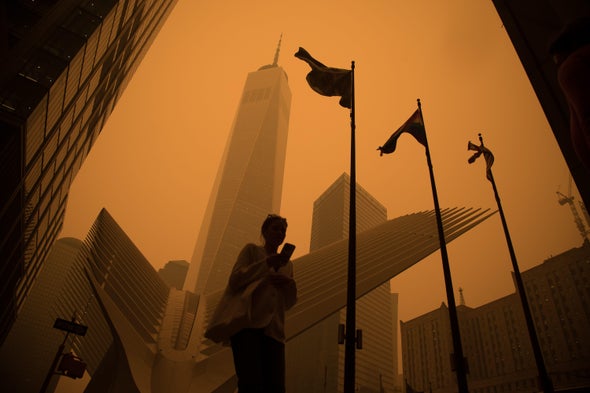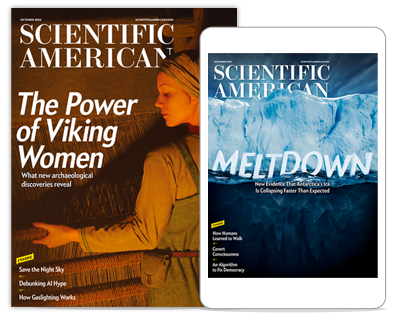If you have been in the path of the smoke from wildfires in Canada this month—or if you’ve been caught up in wildfire smoke before—you may have experienced feelings of anxiety and claustrophobia as the skies turned an apocalyptic orange.
It’s a common reaction and an understandable one, says Thomas Joseph Doherty, a licensed psychologist in Portland, Ore., who takes an environmental approach to mental health. “It looks troubling; it feels troubling,” Doherty says, “the smell, the haze.”
As wildfire season wears on, many more people may end up under a smoky haze, making it important to be aware of the potential mental health fallout, even for those far from the flames. While researchers have long known that wildfire smoke affects physical health, studies are increasingly suggesting that exposure to fires and smoke also affect mental health. Research indicates that losing property or having to flee a nearby wildfire can cause lingering symptoms of depression, anxiety and post-traumatic stress, even years later. The impact of smoke exposure alone is less well studied, but some emerging research suggests it is linked to lower standardized test scores in schoolchildren. Meanwhile studies on air pollution more broadly suggest that people who breathe bad air have higher rates of anxiety and depression. More immediately, facing wildfire smoke for the first time can cause a spike in stress, Doherty says.
“It’s normal to feel overwhelmed,” he says. “It’s a lot to take on.”
Facing Down Fire
Living through a wildfire in one’s own community can have long-lasting mental health consequences, even for those who didn’t lose loved ones or property. A review of research published in 2021 in Behavioral Sciences found elevated rates of post-traumatic stress disorder (PTSD) up to 10 years later in communities damaged by fires. Depression symptoms were also elevated a decade later. Anxiety is less studied, but preliminary research suggests that both adults and children who experience wildfires have higher rates of anxiety and panic disorders in the months after.
The trauma of these natural disasters can also lead to long-lasting cognitive effects, says Jyoti Mishra, a neuroscientist at the University of California, San Diego. Mishra’s work has found that people who experienced California’s devasting Camp Fire of 2018 showed a decreased ability to concentrate and to ignore distractions, compared with people who weren’t exposed. Her team recorded these symptoms in people six to 12 months after the fire. The results, published in January in PLOS Climate, also showed that people who had been directly impacted by the fire, such as by losing property or having to flee flames, and those who simply witnessed the fires in their community both experienced similar cognitive impairments.
“These fire-impacted populations can have greater PTSD symptoms, anxiety and depression, so it’s a complex set of mental health systems that develop,” Mishra says. Mental health conditions are known to influence cognitive processing, she adds. For example, PTSD puts the brain in a constant state of hyperalertness, which makes it harder to filter out distracting information.
Surviving any natural disaster can also have long-term impacts on education and income, says Jisung Park, who researches how environmental factors impact economic opportunities at the University of Pennsylvania. In a study published on June 1 in Nature Human Behavior, Park and his colleagues found that residents of communities who had survived a natural disaster, such as hurricanes or floods, saw their lifetime educational attainment and earnings decline. “A disaster that causes $100 per person in physical damages appears to reduce human capital by roughly the same magnitude,” as measured by the predicted future earnings loss for individuals, Park says. (Human capital is an economics term for the knowledge, skills and health that enable people’s productivity.) Though Park and his team did not study mental health outcomes, education and earnings can have their own impacts on mental health—for example, someone with less financial security might experience more stress. Disasters may also exacerbate existing financial and health inequalities, Park says.
Coping with Smoke
There are few studies on the health impacts of wildfire smoke specifically, but smoke contains many of the same particulates and contaminates as air pollution. Research on air pollution has been consistent. For example, breathing polluted air lowers test scores in school-age children. A small but similar trend is seen in wildfire smoke: a 2022 study published in Nature Sustainability found that wildfire smoke exposure during the school year lowered standardized test scores slightly, compared with years without any smoke exposure.
Air pollution also makes people feel mentally worse. In one large study in China, university students exposed to worse air had lower levels of happiness and higher levels of depression, compared with those exposed to less air pollution. Another review study in 2022 found not only elevated symptoms of depression and anxiety linked to air pollution but also functional and structural changes in multiple brain areas.
In only a handful of studies have researchers tried to investigate the link between exposure to wildfire smoke and mental health, and the results have been mixed. One 2014 paper, published in BMC Psychiatry, showed that after a massive wildfire smoke event in Southeast Asia, locals reported mild psychological stress, which was worst in those who had a higher number of physical symptoms from the smoke and those who perceived the air quality to be dangerous (which it likely was for many). A 2011 study in Environmental Health found an uptick in the use of anxiety drugs and sedatives after wildfires in northwest Spain, but researchers did not query people directly about mental health. Meanwhile a pair of older studies—one on people who experienced smoke from 2003 wildfires in British Columbia and another on people affected by smoke from 1987 fires in California—found no increase in mental-health-related doctor visits or hospitalizations.
Psychologists, however, are increasingly reporting that their patients are reacting to natural disasters with feelings of grief and loss. This could be caused in part by an increasing number of wildfires affecting populated areas as the climate warms and dries or increasing public awareness that these events herald future climate crises, or some combination of both. “Climate change is a mental health issue,” says Nancy Piotrowski, a licensed psychologist in Vallejo, Calif., and council representative for the American Psychological Association’s Society for Environmental, Population and Conservation Psychology.
Given the warming, drying climate, smoke events trigger worries about the future. Piotrowski says her patients often wonder, “Will this happen again? How often?” and “Will next time be worse?” But she adds that not all anxiety is bad. “Anxiety helps get us prepared when we have to get ready to take action,” she says. “But we don’t want it to be paralyzing.”
To cope with the stress of a smoke event, Piotrowski recommends preparedness, including knowing where to look for air quality information and keeping a stash of N95 or KN95 masks, which are effective at blocking smoke particulates. Getting involved in advocacy around climate or other environmental issues can also help a person feel more informed and contribute to solutions that make communities safer from wildfire, she says. If the anxiety becomes overwhelming, she says, don’t dismiss it. A psychologist or other mental health professional can help with coping tools. Cognitive-behavioral therapy, for example, has proved effective at treating anxiety by training people to overcome distorted thinking and use problem-solving techniques to cope with challenges.
“It is not something to dismiss as small. It is a major disruption to people’s lives,” Doherty agrees. He and other psychologists in the Climate Psychology Alliance, an organization of mental health professionals concerned about the emotional fallout of climate change, are working to raise awareness of ecoanxiety and trying to get terms such as “climate grief” into popular therapist databases such as the Psychology Today directory so that people can more readily find support.
“I think the wildfires of this month will be yet another tipping point in our public consciousness of climate change,” Doherty says.


